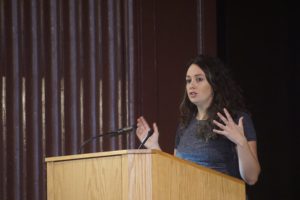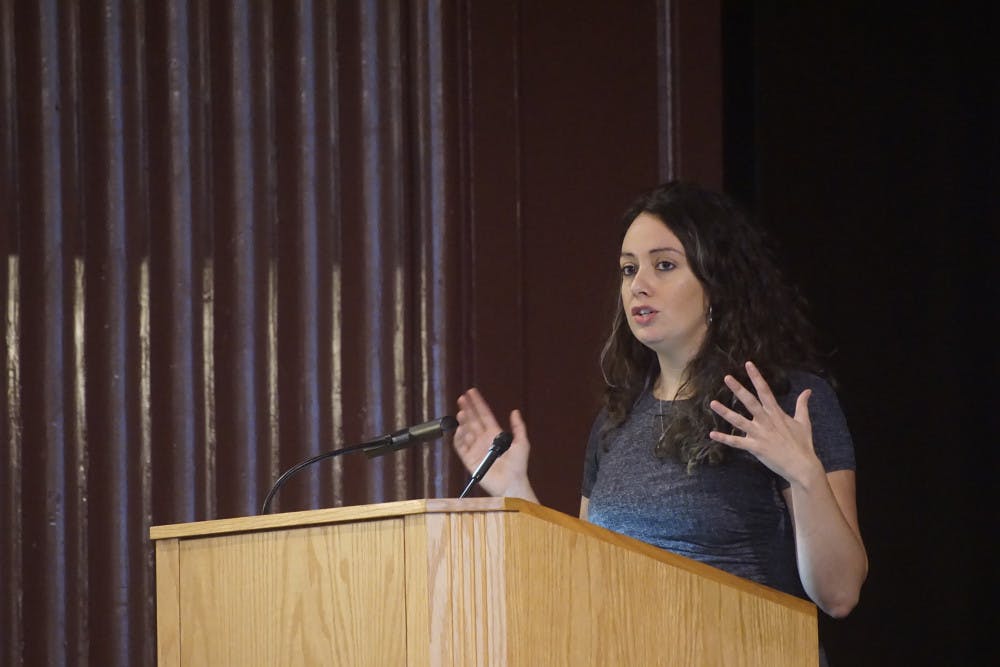By Raquel Sosa-Sanchez
Staff Writer
The College hosted its annual Community Learning Day, sponsored by the Cultural and Intellectual Community Council, in Kendall Hall on Sept. 26. The class of 2022 had the opportunity to engage directly with Jennine Capó Crucet, the author of this year’s assigned summer reading titled, “Make Your Home Among Strangers.”
Crucet gave a keynote lecture on the book and discussed the theme of her novel and how its message relates to the class of 2022.
“Make Your Home Among Strangers” is about a first generation college student, Lizet, who finds herself in unknown territory and at odds with her family when she chooses to leave home for an elite college.
While Lizet, like Crucet, is the daughter of Cuban immigrants, Crucet did not base her character on herself.
“I am not Lizet,” Crucet said. “It’s totally made up.”

According the Miami Herald, Lizet encounters an internal struggle to help her impoverished family and advance her career at the same time.
In the novel, Lizet often feels like an outsider, both in her home and at school. Her parents and siblings fail to grasp and understand her struggles at school. As a result of these struggles, she begins to view her family in a different light.
While in college, Lizet becomes alienated as she attempts to integrate with privileged students and faces discrimination from her professors. In one instance, a college administrator dismisses an accusation of plagiarism based on Lizet’s minority status.
Crucet uses Lizet’s situation to define the “Latino Experience” of first generation college students. She wrote the novel in order to shed light on the lack of stories about first generation college students and Latino culture.
The novel is so important because it highlights experiences that many minorities feel when moving to a new place. Like Lizet, Crucet can still feel the cultural and social differences that plagued her when she moved to her new home in Nebraska. Compared to the Cuban-American lifestyle in Miami, Florida, Crucet has encountered a different reality in Nebraska while teaching as an associate professor at the University of Nebraska-Lincoln.
“If there isn’t discomfort there isn’t opportunity for growth,” Crucet said. “First thing I did when I moved to Nebraska, I found some cows to herd.”
With the new experience in mind, Crucet documented the cultural and ethnic differences between her and the Nebraska natives. Crucet noted the bias and prejudice of the ranchers and speculated on the state of race and ethnicity in the country today.
In response to a question about latino integration in schools and universities, Crucet claims that immigration is not the only topic that has to be addressed concerning latinos in America.
“I had to recognize that I was [at Cornell] to enrich the white person’s experience,” she said.
Students such as freshman elementary education major Gabriella Son applauded Crucet’s message of latino integration in universities.
“The address was incredibly powerful and resonated deeply,” she said. “I think I really needed this.”
Rosie Hymerling (67’), a trustee and long time alumna of the College, praised Crucet’s courage to address vital issues among first generation college students.
“These issues cannot simply be ignored,” she said. “There are just some things you cannot sweep under the rug.”







